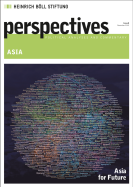
Feminism
In the decades since Chipko, climate change and its consequences have become key issues for the women’s movement in India.Urvashi Butalia
It was a long time ago that, as young activists in the women’s movement, we began to be aware of environmental issues. It was the Chipko and Appiko movements of the mid-seventies and eighties – in which village women embraced trees to prevent them from being cut – that drew our attention to the consequences, in women’s lives, of the devastation of the environment. Well aware of the increased distances they would have to walk in search of water, women chose this unique form of protest. Later, water and water scarcity would go on to become major issues in the movement.
This was our first glimpse into an issue that would, over the years, become profoundly serious for women. Unpredictable seasons meant forced migration, ill health, the loss of education, and precarious work opportunities. Sometimes this precarity led to women being trafficked for sex work and domestic labor. Always, because they are more vulnerable, in ‘natural’ disasters, such as earthquakes and tsunamis, or indeed more urban tragedies such as the Union Carbide factory gas leak in Bhopal, it would be women who suffered – and resisted – the most.
And always, they were the ones largely left out of planning and rehabilitation.
In the decades since Chipko, climate change and its consequences have become key issues for the women’s movement in India. Women’s mobilization and participation in the battle for a safe and stable environment has changed the nature of protest movements.
The battle isn’t only about the loss of forests or rivers or seasons or ozone, but it is also about how these are linked to poverty, jobs, education, health and more. Over the years, as globalization sweeps across India and resources are privatized, community lands are purchased by global companies and jobs offered in return, to the men. Women lose subsistence land and access to resources, and are thus impoverished.
However, protest movements – as against the building of the Narmada dam, have generated a rich culture of songs, plays, ballads and stories that continue to give hope and solace to people in the midst of what seems like an uncertain future.
Urvashi Butalia is Director, Founder and Chief Executive Officer of Zubaan, a renowned feminist publisher in India.
Economy
There was a time when middle class Indians grew up on the dictum of ‘simple
living, high thinking’. It was the introduction of economic liberalization and
globalization, in the early 1990s, that transformed this assertion of a moral value
to a symptom of failure. Simplicity came to be treated as a form of denial in the
face of scarcity. This transition happened in the same three decades in which
climate change came to be recognized as an accelerating crisis.
Today if India’s per capita carbon footprint is still among the lowest in the world, it
is because the vast majority of our people still do not have a big enough income
to be large scale consumers. Anyone who is committed to egalitarian and
democratic values cannot support such forced simplicity.
However, the grim reality of forced simplicity also cannot be allowed to obscure
two key questions: Why is voluntary simplicity liberating? Why should the
global-south live simple when it is the carbon spewing excess consumption by
the global-north that has severely disrupted the ecological balance of our
planet?
M.K. Gandhi would answer the first question with one word: Swaraj. This means
having the strength to rule over one’s passions. Swaraj as control over the self
makes it possible to distinguish between needs and wants from a position of
wisdom rather than external compulsion. This remains true whether you are part
of the global-north or global-south.
Therefore, a tit-for-tat answer to the second question is unviable. Swaraj as an
intrinsic value cannot be made contingent on what ‘others’ do. This is why the
structural violence that has led to the climate crisis calls not for counter violence
but ahimsa (nonviolence) as method and swaraj as goal. Only then can both
production systems and consumption patterns be reconfigured to serve our
‘needs’ in such a way that having fewer ‘wants’ becomes the highest freedom.
Rajni Bakshi is a journalist and author of several books including 'Bazaars,
Conversations and Freedom: For a market culture beyond greed and fear'.
Today if India’s per capita carbon footprint is still among the lowest in the world, it is because the vast majority of our people still do not have a big enough income to be large scale consumers.Rajni Bakshi






